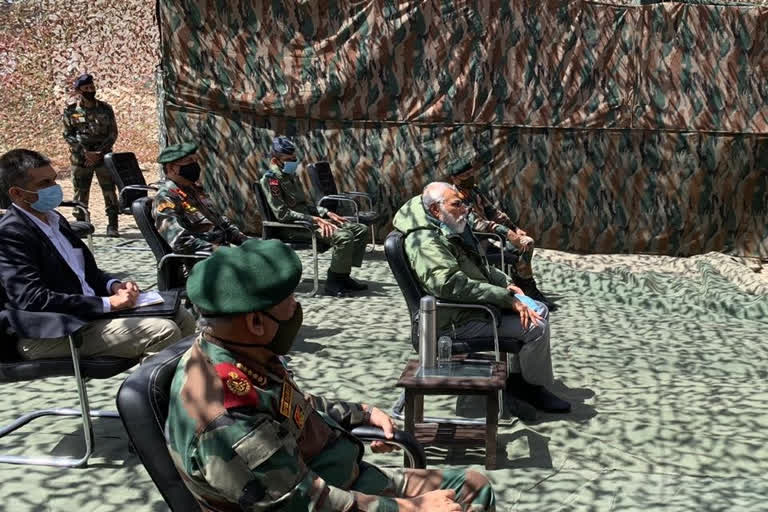New Delhi: The Prime Minister is well known for his ability to surprise the nation by his actions. It was no different on July 3 when images flashed across our television screens of Mr Modi landing at Leh, visiting injured soldiers, attending briefings, and giving a rousing speech. The visit came in the backdrop of the ongoing standoff between the Indian and Chinese armies in Eastern Ladakh and is significant for several reasons.
The visit of the Prime Minister to the conflict theatre underscores that the government has become alive to the seriousness of the crisis. There had been views expressed that this matter was being underplayed by the government, perhaps in the hope that military-level talks could result in a resolution. That hope was shattered by the bloody brawl at Galwan valley on 15 June. I think there is now a clear understanding that the current Chinese actions are entirely different from past standoffs that had been peacefully resolved to both sides' mutual satisfaction. Since the past two months, the Chinese Ministry of Foreign Affairs has been talking about de-escalating the "tensions as soon as possible and safeguard the peace and tranquillity."
However, they have not hesitated to lay untenable claims on the Galwan Valley and are busy strengthening their military positions in areas that India considers its territory.
The Ladakh visit is an indication that the lack of any visible progress in the ongoing negotiations is not acceptable to the Indian side. The Prime Minister was aware that his trip would invoke a reaction from the Chinese government, as indeed it has. Chinese Foreign Ministry spokesperson said, “No party should engage in any action that may escalate the situation at this point.” By going through with the visit, it has been clearly signalled that a certain escalation level is preferable to the stalemate on the Line of Actual Control (LAC).
READ:| PM Modi sends strong message to China, says age of expansionism is over
The Prime Minister’s speech was direct and hard-hitting. Calling out China’s expansionism, he said, “History is witness that expansionist forces have either lost or were forced to turn back.” In stating that “those who are weak can never initiate peace”. This was a signal that India would not negotiate from a position of weakness.
The Prime Minister was also conscious of the domestic audience. After some criticism over his remark that Chinese soldiers were not in Indian territory, he has sought to reassure the citizens that India would respond firmly to Chinese efforts to expand into Indian territory. This is also reflected in the recent government decisions to review the participation of Chinese companies in various infrastructure projects, and the power and IT industries.
India’s intent has been conveyed, but there is still a rocky road ahead. Unfortunately, sections of the television media seem to be in an intense competition to create the most sensational headlines to establish that we have already won a great victory over the Chinese. This could lull us into a sense of complacency.
The hard fact is that the Chinese soldiers continue to be on what we consider Indian territory, and the Prime Minister has now conveyed that we will respond to this resolutely. We have just climbed one step on the escalation ladder, and every step-up carries risks. Conflict is not a one-sided contest, and the opponent also has his say. Therefore, we must be prepared for some Chinese reaction that could range from an inflexible stance at the LAC to trade retaliation to our policies or even a limited military conflict.
We are in for a long haul that will require concerted military preparations and a whole-of-government approach to tackle a powerful and assertive neighbour. We must move beyond rhetoric to a clear-eyed assessment of the likely impact of our policy decisions and future courses of action.
While India prepares for its contingencies, the Chinese leadership must also deeply introspect on the consequences of their behaviour. One of the greatest follies in strategic thinking is to equate the winning of battles with winning the war. Cathal J. Nolan, in his book The Allure of Battle, writes:
"Winning the day of the battle is not enough. You have to win the campaign, then the year, then the decade. Victory must usher in political permanence. If it does not, after a pause to recover and rearm, the war will continue."
The Chinese army may feel that they have won the battle for the fingers on the north bank of the Pangong Tso, but they have ushered in an era of India-China hostility that will have significant geopolitical impacts in the region. How this will play out in the future is uncertain, but it would be a folly for either side to declare a premature victory.



